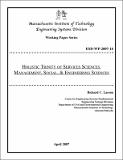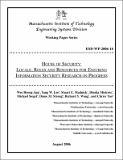Browsing Engineering Systems Division by Title
Now showing items 113-132 of 273
-
Gas-Electricity Coordination in Competitive Markets under Renewable Energy Uncertainty
(Massachusetts Institute of Technology. Engineering Systems Division, 2013-10)As climate concerns, low natural gas prices, and renewable technologies increase the electric power sector’s dependence on natural gas-fired power plants, operational and investment models for gas and electric power systems ... -
GDP-Based Productivity in Ambulatory Healthcare: A Comparison with other Industry Segments, 1998-2005
(Massachusetts Institute of Technology. Engineering Systems Division, 2008-02)Few studies have focused on productivity in healthcare, let alone in ambulatory healthcare. Measurement of productivity in various healthcare segments has generally shown that productivity has either decreased (over some ... -
Global Comparison Aggregation Services
(Massachusetts Institute of Technology. Engineering Systems Division, 2002-12)Web aggregation has been available regionally for several years, but this service has not been offered globally. As an example, using multiple regional comparison aggregators, we analyze the global prices for a Sony ... -
Global Outsourcing of Professional Services
(Massachusetts Institute of Technology. Engineering Systems Division, 2006-08)As a growing number of firms outsource more of their professional services across geographic and temporal boundaries, one is faced with a corresponding need to examine the long-term ramifications on business and society. ... -
Growing Towards a Sustainable Biofuel Future: A Comprehensive Policy Strategy for Navigating Tradeoffs and Stakeholder Interests in U.S. Agriculture
(Massachusetts Institute of Technology. Engineering Systems Division, 2008-03)Rapid growth of biofuels production in the United States is reshaping the agricultural industry, delivering both benefits and conflict among stakeholders. Routes forward on biofuels production should be viewed in the context ... -
Growth Patterns of Subway/Metro Systems Tracked by Degree Correlation
(Massachusetts Institute of Technology. Engineering Systems Division, 2011-08)Urban transportation systems grow over time as city populations grow and move and their transportation needs evolve. Typical network growth models, such as preferential attachment, grow the network node by node whereas ... -
Heterogeneity and Network Structure in the Dynamics of Diffusion: Comparing Agent-Based and Differential Equation Models
(Massachusetts Institute of Technology. Engineering Systems Division, 2004-11)When is it better to use agent based (AB) models, and when should differential equation (DE) models be used? Where DE models assume homogeneity and perfect mixing within compartments, AB models can capture heterogeneity ... -
Heterogeneous Unit Clustering for Efficient Operational Flexibility Modeling for Strategic Models
(Massachusetts Institute of Technology. Engineering Systems Division, 2013-01)The increasing penetration of wind generation has led to significant improvements in unit commitment models. However, long-term capacity planning methods have not been similarly modified to address the challenges of a ... -
Hiring College Graduates to Flip Hamburgers: An Endogenous Theory of Professionalization
(Massachusetts Institute of Technology. Engineering Systems Division, 2014-03)In this paper, we offer an endogenous theory of professionalization and ever-higher degree attainment. We theorize that higher education is a self-driving growth engine. We introduce two endogenous mechanisms that act on ... -
The Historical Roots of the Field of Engineering Systems: Results from an In-class Assignment
(Massachusetts Institute of Technology. Engineering Systems Division, 2012-03)The field of Engineering Systems (ES) is quite young but there are intellectual roots that go far back in time. At least that is the working hypothesis in an integrative capstone assignment given in the first doctoral ... -
Holistic Trinity of Services Sciences: Management, Social, & Engineering Sciences
(Massachusetts Institute of Technology. Engineering Systems Division, 2007-04)Services industries comprise about 75% of the economy of developed nations. To design and operate services systems for today and tomorrow, we need to educate a new type of engineer who focuses not on manufacturing but on ... -
House of Project Complexity – Understanding Complexity in Large Infrastructure Projects
(Massachusetts Institute of Technology. Engineering Systems Division, 2013-05)This paper describes our conceptualization of complexity in Large Infrastructure Projects (LIPs). Since complexity itself is an emergent concept that is hard to pin down, we focus on the relationship between various project ... -
House of Security: Locale, Roles and Resources for Ensuring Information Security Research-in-Progress
(Massachusetts Institute of Technology. Engineering Systems Division, 2006-08)In this paper we redefine information security by extending its definition in three salient avenues: locale (beyond the boundary of an enterprise to include partner organizations), role (beyond the information custodians’ ... -
How Useful is Quantitative Risk Assessment?
(Massachusetts Institute of Technology. Engineering Systems Division, 2003-07)This article discusses the use of Quantitative Risk Assessment (QRA) in decision-making regarding the safety of complex technological systems. The insights gained by QRA are compared with those from traditional safety ... -
HSR as Transit: The continuing transportation-driven evolution of metropolitan form
(Massachusetts Institute of Technology. Engineering Systems Division, 2014-08)With high-speed rail (HSR) now often fulfilling a commuting function within an hour’s travel time from principal metropolitan cities, it becomes the latest in a long line of transportation technologies to elicit change in ... -
Identifying the Dynamics of Technology Transition: ADS-B Adoption in the National Airspace System
(Massachusetts Institute of Technology. Engineering Systems Division, 2007-01)Congestion is a growing problem in the National Airspace System (NAS). Predictions indicate that the NAS, as a whole, will be operating at 75% of capacity by 2010 [2] and that the demand in capacity in air transportation ... -
The impact of high-speed rail and low-cost carriers on European air passenger traffic
(Massachusetts Institute of Technology. Engineering Systems Division, 2013-07)The expansion of high-speed passenger rail service is often argued as a potentially effective, lower-carbon substitute for intercity air travel. Previous studies on high-speed rail on air travel in Europe and Asia have ... -
The Impact of Instability on Complex Social and Technical Systems
(Massachusetts Institute of Technology. Engineering Systems Division, 2002-05)Instability is a pervasive phenomenon that has deep implications for virtually all complex social and technical systems. In engineering, the identification and mitigation of various types of technical instabilities is a ... -
Improving the Software Upgrade Value Stream
(Massachusetts Institute of Technology. Engineering Systems Division, 2001-12)This paper reports findings from a two-year study to identify Lean practices for deriving software requirements from aerospace system level requirements, with a goal towards improving the software upgrade value stream. The ... -
Improving the Systems Engineering Process with Multilevel Analysis of Interactions
(Massachusetts Institute of Technology. Engineering Systems Division, 2014-03)The systems engineering V (SE-V) is an established process model to guide the development of complex engineering projects (INCOSE, 2011). The SE-V process involves decomposition and integration of system elements through ...




















